动词变名词规律总结
英语动词变名词的变化规则

英语动词变名词的变化规则在英语语法中,动词(Verb)和名词(Noun)是语言中最基本的词类之一。
动词用来表示动作、状态或事件,而名词则用来表示人、事物、地点或概念等。
然而,有时我们需要将动词转化为名词形式。
英语中动词变名词的变化规则可以通过以下几种方式实现:1. 加后缀 -ing将动词转化为名词的一种常见方式是在动词后面加上后缀“-ing”。
这种形式的名词通常表示正在进行的动作或某个动作的结果。
例如: - learn (学习) → learning (学习) - swim (游泳) → swimming (游泳) - read (阅读) → reading (阅读)需要注意的是,部分动词在后缀“-ing”后需要做一些拼写上的变化,例如: - run (跑步) → running (跑步) - write (写) → writing (写作)2. 加后缀 -tion, -sion, -ation or -ition另一种常用的将动词转化为名词的方式是在动词的基础形式后面加上后缀“-tion”, “-sion”, “-ation” 或“-ition” 之一。
这些后缀表示动作、状态或概念。
例如: - create (创造) → creation (创造) - admit (承认) → admission (承认) - transmit (传输) → transmission (传输)需要特别注意的是,部分动词在加上这些后缀时需要做一些拼写上的变化,例如: - operate (操作) → operation (操作) - perform (执行) → performance (表演)3. 加前缀 re-有些动词在变成名词时需要加上前缀“re-”。
这种前缀表示重复或重新进行某个动作。
例如: - build (建造) → rebuild (重建) - print (打印) → reprint (重印) - connect (连接) → reconnect (重新连接)需要注意的是,并非所有动词都适用于加上“re-”前缀变成名词的情况。
英语动词变动名词的规则是什么

英语动词变动名词的规则是什么
1、一般情况下直接在词尾加ing
如:play→playing
2、以不发音的字母e结尾的单词,去掉字母e,再加ing。
如:dance→dancing
3、单词最后三个字母为“辅音-元音-辅音”结构,并且通常为重读音节的动词,先双写末尾的辅音字母,再加ing。
如:swim→swimming
扩展资料
动词变为名词的方法
1.词形不变,词性改变。
例如:work, study, water, plant等可以用作动词,也可以用作名词。
2. 一些动词在词尾加上-er或-or之后就变成了表示“某一类人”的`名词。
例如:work—worker, teach—teacher, sing—singer, jump—jumper, play—player, learn—learner, visit—visitor, invent—inventor等。
注意:1)以不发音的e结尾的动词,在词尾加-r。
例如:drive—driver, write—writer等。
2)以重读闭音节结尾,且末尾只有一个辅音字母的动词,应双写末尾的辅音字母,再加-er。
例如:run—runner, win—winner,begin—beginner等。
3. 在动词词尾加-ing变成名词(方法与动词变为现在分词的方法相同)。
例如:meet—meeting, build—building, wait—waiting, wash—washing, swim—swimming, shop—shopping, begin—beginning等。
初中常见动词变名词的情况总结

初中英语常见的动词词性变名词词性第一种情况:词尾+mentachieve-achievement成就;成绩agree--agreement (意见或看法)一致;同意develop-development发展encourage-encouragement鼓励improve-improvement改进;改善move--movement移动punish--punishment惩罚require--requirement要求teat--treatment对待第二种情况:词尾+er或or或rdesign--designer设计师lead--leader领导者;首领own--owner主人;物主play--player运动员;播放机report--reporter记者sing--singer歌手speak--speaker说某种语言的人;发言人teach--teacher老师;教师travel--traveler旅行者;漂泊者wait--waiter服务员work--worker工人;工作者act--actor(男)演员/actress女演员direct--director导演invent--inventor发明家visit--visitor访问者;访客dance--dancer舞蹈家;舞者drive--driver驾驶员manage--manager经理;经营者write--writer作者;作家第三种情况:词尾+(t)ion或去e加(t)ion或变e为a加-tion collect--collection 收集;采集;收藏品connect--connection连接;关系direct--direction方向;方位invite--invitation发明protect--protection保护;保卫suggest--suggestion建议celebrate--celebration庆祝;庆典communicate--communication交流;沟通congratulate--congratulation祝贺educate--education教育pollute--pollution污染introduce--introduction介绍;引进produce--production制造;产量;生产第四种情况:词尾+ingbuild--building建筑物;房子cook--cooking烹饪draw--drawing图画end--ending结尾;结局feel--feeling感觉;感触mean--meaning意义;意思meet--meeting会议;集会paint--painting油画;绘画park--parking停车read--reading阅读;读物say--saying谚语;格言ski--skiing滑雪train--training训练;培训walk--walking步行;散步其它情况:advise--advice劝告;建议choose--choice选择die--death死亡discover-discovery发现;发觉fail--failure失败;失败者laugh--laughter笑声marry--marriage结婚,婚姻please--pleasure愉快serve--service服务;接待succeed--success成功;成功的人/事think--thought思想;想法weigh--weight重量;分量。
(完整版)词性转换常见规律归纳

动词变名词1.v+ ment 结尾achieve---achievement 成就advertise---advertisement advertisingagree— agreementargue---argument争吵announce --- announcement 通知amuse--- amusement 娱乐commit奉献—commitment develop---development disgree—disagreementequip装备---equipment装备,器材govern 统治—government 政府manage---management 经营管理settle--- settlement 定居2.V+ tion 结尾以t, te, de, 结尾的动词常去E 或直接加ion admit 承认—admissionattract吸引—attraction 有吸引力的事或人;令人向往的地方conclude—conclusion 结论compete—competition竞争,比赛discuss—discussion 讨论educate-----educationdecide----decision describe—description描写,描绘organize----organization imagine—imagination 想象力introduce—introduction 介绍instruct—instruction 指导,介绍invent—inventor / invention illustrate 阐明,举例说明--illustrationinvite—invitationinspire---inspiration 灵感,鼓舞人心的pollute----pollution 污染predict---prediction 预言pronounce ---pronunciation resolve 决心-----resolution 决心impress 给人印象—impression 印象permit 允许-----permission suggest-建议,暗示--suggestion solve解决-----solution 解决方法3.V+ ance 结尾allow—allowance 允许appear—appearance 外貌,出现perform----performance 演出exist—existance 存在4.V+ ing 结尾bathe 洗澡---bathingend 结束----ending 结尾,结局train 训练---training mean ---- meaning 意义say-----saying 谚语5.V+ 其他beg(乞讨)—beggar 乞丐sit--seat 座位employ--employer 雇主,老板--employee雇员believe—belief 信仰behave 行为,举止----behavior know---knowledgefly—flight 飞行heat 加热---heat 热量hit 撞击------hit 轰动一时的人或物,碰撞mix 混合-----mixture 混合物press 按,压—pressure 压力receive—receptionist 接待员serve—service 服务succeed-- successtour 在-----旅游- tourist 游客pursue—pursuit 追求,从事propose—proposal 建议withdraw—withdrawal 取钱;收回;撤退survive—survival--survivor 幸存者arrive-- arrival到达analyze—analysis 分析名词变形容词1名词+yanger 生气-----angry honest—honesty 诚实的hunger---hungry fog—foggy有雾的fur----furry 毛皮的guilt 罪恶---guilty 内疚的health---healthyluck---luckycloud---cloudy wind—windy rain---rainysnow---snowysun—sunnytourist------touristy 游客多的business---busysalt 盐--- salty 咸的shine---shiny 发亮的silk 丝绸—silky 丝绸般的sleep---sleepy 昏昏欲睡的taste 口味,品味------tasty 甜的2.名词+ edbalance –balanced 平衡的spot 斑点,地点----spotted 有斑点的talent-----talented 有天赋的organized 有组织的distusted 厌恶的offended 生气的crowded 拥挤的polluted 被污染的pleased 高兴的3.名词+ ful/lessmeaning—meaningful 有意义的care—careful/ careless 小心的;粗心的help---helpful / helplesshome—homeless 无家可归的colour---colourfulpain 疼痛---painful 痛苦的use---useless/ useful thank—thankful 充满感激的peace 和平---- peaceful 平静的,宁静的playful 顽皮的,爱玩耍的4.名词+ ableadjustable 可调整的comfort---comfortable knowledge---knowledgeable suit 一套-----suitable 合适的5.名词+ ous courage—courageous 勇敢的danger—dangerousmystery 神秘-----mysterious 神秘的6.ce 变t confidence----confident difference---different dependence—dependent independence--independent7. al 结尾Addition—additional 附加的,额外的Class—classical 经典的medicine 药----medical 医学的music---musicalnature---natural 自然的person---personal (私人的) nation—national 国家的education---educational有教育意义的tradition----traditional 传统的origin起源---original 新颖的;独创的grammar—grammatical 语法的globe—global 全球的8.名词+ lyfriend—friendlylive---lively 活跃的,有生气的love—lovely 可爱的9.+ en 结尾wood—wooden 木制的wool—woolen 羊毛的10. 其他energy精力---energetic strategy—strategic 战略的fool 傻子—foolish 愚蠢的freedom 自由—free 空的,免费的height 高度—high illness 疾病--- ill love—loving 慈爱的death---deadpleasure---pleasant / pleased popularity 流行性—popular pride---proudscientist----scientific 科学的形容词变副词1.形容词+ lybad—badlybright—brightly 明亮地casual—casually 随意地clear—clearly 清楚地complete—completely 完全correct---correctly 正确地final--finally fortunate—fortunately幸运地general—generally 一般来讲loud—loudlyparticular 特殊的,独特的—particularlypolite—politelyproper 合适的-,恰当的---properlymain------mainly 主要地most 多数-----mostly 多半,大多数normal---normally 正常地quick—quicklyquiet—quietly 轻轻地,安静地real—reallyrecent 最近的----recently 最近;近来hard 难的;努力地---hardly几乎不late 迟的—lately 最近;近来sad--sadlyslow---slowly special—specially 专门,特殊地specific---specifically特定地,明确地strong—strongly 坚决地,强烈地sudden—suddenly突然usual—usually2. 以le 结尾的去e + ycomfortable---comfortably gentle—gentlypossible---possibly simple ----simply 仅仅;只;简单地terrible---terribly3. 辅音字母+ y 变ilyeasy—easilyheavy—heavilyhappy--happily4.特殊good—well好地well 身体健康的,井true—truly形容词变名词efficient有效率的—efficiency 效率patient—patience/impatience dependent—dependenc依赖性independent—independency 独立性true—truth high—height wide—width long—lengthpossible—possibilityresponsible—responsibilityurgent—urgency 紧急prosperous—prosperity 繁荣accurate—accuracy 准确性形容词变动词modern—modernize social--socialize fast--fasten short/shorten long—lengthen—length(n.) wide--widen less--lessenstrong—strengthen—strength(n.)large—enlarge名词变动词computer--computerize名词---形容词—副词beauty 美,美人—beautiful—beautifully care—careful—carefully care—careless—carelessly difference---different---differently fortune—fortunate—fortunately/u nfortunately happiness—happy—happily hunger—hungry--hungrily health—healthy—healthily luck—lucky—luckily noise—noisy—noisily pride—proud—proudly骄傲地sadness—sad—sadlysafety 安全;安全的地方—safe —safelysilence—silent---silently 默默地success—successful—successfully truth—true—truly unluck—unlucky—unluckily wonder 奇迹—wonderful—wonderfully方位的词名词—形容词East—eastern West—westernSouth—southern North---northern In the west of ChinaIn the western part of China四大洲名词-----形容词Asia 亚洲–---- AsianAfrica 非洲----- AfricanEurope欧洲----- European America 美洲-----American既是形容词又是副词early get up early ;an early trainlate be late for classcome late for schooldeep dive deep into the seaa hole deep largehigh jump high;a high mountainhard a hard question;a hard stone work hard / study hardrain hardlong It takes too longIt takes a long timefar jump farMy home is far from school straight a straight linego straight along here。
英语单词词性转换的基本规律

英语单词词性转换的基本规律.动词(v.)→名词(n.)(a)词形不变,词性改变例如:work, study, water, plant等可以用作动词(工作,学习,浇水,种植),也可以用作名词(工作,学习,水,植物).(b)一些动词在词尾加上-er或-or之后就变成了表示"某一类人"的名词例如:work—worker, teach—teacher, sing—singer,jump—jumper, play—player, learn—learner,visit—visitor, invent—inventor,collect—collector等.注意:1)以不发音的e结尾的动词,在词尾加-r.例如:drive—driver, write—writer等.2)以重读闭音节结尾,且末尾只有一个辅音字母的动词,应双写末尾的辅音字母,再加-er例如:run—runner, win—winner,begin—beginner等.(c)在动词词尾加上-ment 变成名词例如:achieve—achievement (成就)advertise—advertisement//advertising(广告)agree—agreement disgree—disagreementamuse—amusement (娱乐) improve—improvement(争吵)commit(奉献)—commitment develop—development (发展)depart—department (局,部) govern(统治)—government(政府)manage—management (管理) equip—equipment (装备)有些单词比较特殊,需把动词后的e去掉再加ment.例如:argue—argument(争论)(d)在动词词尾加上-(t)ion/(s)ion变成名词例如: attract—attraction; instruct—instruction;invent—invention discuss—discussion;express—expression educate—education;graduate—graduation; operate—operation (去e再加"ion")compete—competition; organize—organization (把e改成其他字母再加"tion")decide—decision conclude—conclusion (把de改为s再加"ion")describe—description描写,描绘 (这是特例,不规则变化)(e)在动词词尾加上-ance变成名词例如: appear—appearance (外貌;出现)perform—performance (演出)accept—acceptance (接受)(f)在动词词尾加-ing变成名词 (方法与动词变为现在分词的方法相同)例如:meet—meeting build—building wait—waitingbathe—bathing say—saying(谚语) mean—meaningend —ending train —training wash—washing注意:以重读闭音节结尾,且末尾只有一个辅音字母的动词,应双写末尾的辅音字母,再加-ing 如:swim—swimming shop—shopping begin—beginning(g)其他一些比较特殊的变化例如: Beg(乞讨)—beggar(乞丐) behave(行为举止)—behaviorknow(知道)—knowledge(知识) fly—flight (飞行)heat (加热)—heat(热量) hit (撞击)—hit( 轰动一时的人或物,碰撞)mix (混合)—mixture(混合物) press(按,压)—pressure(压力)sit(坐)—seat (座位) succeed—success(成功)tour—tour(旅游)/ tourist (游客)2.动词(v.)→形容词(adj.)(a)动词后面加able,以e结尾的动词则去e加able,表示具有此性质,特点或属性.例如: afford-affordable;love-lovable(b)动词后面加ed,以e结尾的动词则直接加d,表示被动性的属性或特点.例如: scatter-scattered use-used(c)不规则的动词则必须记忆,记住其过去分词形式.规律不大,意义同(b).3.名词(n.)→形容词(adj.)(a)在名词后面加-y可以变成形容词(尤其是一些与天气有关的名词)例如: rain—rainy, cloud—cloudy, wind—windy, snow—snowy,health—healthy, luck—lucky,anger—angry guilt—guilty(内疚的)tourist—touristy(游客多的) , salt (盐)—salty (咸的)silk(丝绸)—silky(丝绸般的), sleep—sleepy (昏昏欲睡的)注意:1)如果以重读闭音节结尾,且词尾只有一个辅音字母,这时应双写辅音字母再加"-y".如: sun—sunny, fun—funny, fog—foggy(有雾的), fur—furry(毛皮的)2)少数以不发音的e结尾的名词变为形容词时,应去掉e再加"-y".如: noise—noisy, ice—icy, shine—shiny(发亮的), taste(口味)—tasty(甜的)(b)名词后面加-ed,以e结尾的直接加d.例如: spot(斑点)—spotted(有斑点的); talent—talented (有天赋的)organize—organized 有组织的; balance—balanced(平衡的)(c)一些抽象名词在词尾加-ful可以变为形容词例如:care—careful, thank—thankful, help—helpful,use—useful, meaning—meaningful(d)在名词后加-less构成含有否定意义的形容词例如:care—careless(粗心的), use—useless(无用的)hope—hopeless(没希望的),home—homeless(无家可归的)(e)一些以-ce结尾的名词,把-ce改为-t变成形容词例如: difference—different, silence—silent, confidence—confident(f).在名词后加-ly变为形容词例如: friend—friendly, love—lovely, live---lively(g).在名词后加-ous变为形容词例如: danger—dangerous(h)名词后面加-al变为形容词例如: music—musical; medicine—medical (这个比较特殊)(i)名词后面加-able变为形容词,如果以e结尾就去e再加"-able".例如: adjust—adjustable 可调整的 value—valuable有价值的(j)名词后面加-en变成形容词例如: wood—wooden 木制的 wool—woolen 羊毛的(k)一些表示国家的名词可以在词尾加-ese, -ish或-n构成表示国籍,语言的形容词例如:China—Chinese, Japan—Japanese, England—English,America—American, India—Indian, Australia —Australian(注意Canada—Canadian)4..形容词(adj.)→副词(adv.)▲一般在形容词的词尾加-ly可以变成副词例如: quick—quickly, slow—slowly, loud—loudly, sudden—suddenly 等但是,以下几点值得注意:(a) 一些以"辅音字母+y"结尾的形容词,要把y改为i再加-ly例如: happy—happily, angry—angrily, lucky—luckily, heavy—heavily, noisy—noisily(b) 有些以-ble或-le结尾的形容词,去掉e加-y例如:possible—possibly, terrible—terribly(c)少数以e结尾的形容词,要去掉e再加-ly例如: true—truly但绝大多数以e结尾的形容词仍然直接加-ly 例如: polite—politely, wide—widely(d)以-l结尾的形容词变为副词时要在词尾加-ly,以-ll结尾的才在词尾只加-y.例如: usual—usually, careful—carefully, useful—usefullyfull—fully (以-ll结尾的才只加y)OK,以上就是英语单词词性变化的一般规律,希望对大家有所帮助PS:有些同学可能对元音辅音以及重读闭音节不是很了解,那我在这里再做下补充说明.1.英语26个字母中,a e i o u是元音字母, y是半元音字母, 其余都是辅音字母.★所谓半元音就是有时候做元音,有时候做辅音.半元音字母y做元音有: shy,sky做辅音比如最简单的:yes2.开音节和闭音节开音节分两种:绝对开音节和相对开音节绝对开音节指的是"元音字母结尾"的音节 (例如 we, hi等)相对开音节是指"辅音字母-元音字母-辅音字母-不发音的e"的音节,(r除外). ( 例如,take,make等)比如:take (在这个单词中,t是辅音,a是元音,k是辅音,e是不发音的元音)◆在开音节中, 元音字母发他们在字母表中的音闭音节, 则是指"辅音字母-元音字母-辅音字母"的音节 ( -al等除外) (例如:leg,cross等)◆在闭音节中,元音字母发不同的音a e i o u例 sat let sit not nut (试着读下这些单词,这些单词中,元音发的音都不是它们在字母表中发的音)2.英语重读闭音节就是以辅音因素结尾的,而且是重读音节的音节.比如apple 划音节就因该是ap/ple 前面那个ap是一个音节,这个音节以辅音因素p结尾,所以就是闭音节.(仅仅能看出是闭音节,是不是重读闭音节还要看这个音节是不是重读的)重读闭音节三要素:1. 必须是重读音节;2. 最后只有一个辅音字母;3.元音字母发短元音 ( 说通俗点,打个比方, /u/是短元音,/u:/是长元音)重读闭音节即两个辅音中间夹一个元音.如:sit---sitting begin---beginning(重读在gin这个音节上)●像travel这个单词,"vel"也是"辅音+元音+辅音"的结构,但是重音不在vel这个音节上,所以不用双写"l",可以为travelled,也可以是traveled,更常用的是后者.英语单词词根词缀和词性转换英语中常见的后缀一、名词性后缀1,-age为抽象名词后缀,表示行为,状态和全体总称percentage百分数,百分率,voltage电压,伏特数,lavage灌洗,洗,出法,gavage管词法,curettage刮除法,shortage 不足,缺少。
动词变名词的规则

1.v+ ment 结尾achieve---achievement 成就advertise--- advertisement// advertisinga gre e— (in )agreementapartment 公寓amusement 娱乐argue---argument争吵commit奉献—commitmentcompliment 称赞,恭维develop---developmentdisgree—disagreementdepartment 局,部experiment 实验,试验equip 装备---equipment 装备,器材govern 统治—government 政府manage---management 经营管理2.V+ tion 结尾attract吸引—attraction 有吸引力的事或人;令人向往的地方conclude—conclusion 结论compete—competition 竞争,比赛discuss—discussion 讨论educate-----educationdecide----decisiondescribe—description描写,描绘express 表达----expression 词语;表达方式graduate 毕业—graduationoperate 操作,动手术—operationorganize----organizationinstruct—instruction 指导,介绍invent—inventor / inventioninvite—invitationinspire---inspiration 灵感,鼓舞人心的---pollute----pollution 污染predict---prediction 预言pronounce ---pronunciationresolve 决心-----resolution 决心permit 允许-----permissionsuggest-建议,暗示--suggestionsolve解决-----solution 解决方法3.V+ ance 结尾appear—appearance 外貌,出现perform----performance 演出4.V+ ing 结尾bathe 洗澡---bathingend 结束----ending 结尾,结局train 训练---trainingmean ---- meaning 意义say-----saying 谚语5.V+ 其他Beg(乞讨)—beggar 乞丐behave 行为,举止----behaviorknow---knowledgefly—flight 飞行heat 加热---heat 热量hit 撞击------hit 轰动一时的人或物,碰撞mix 混合-----mixture 混合物press 按,压—pressure 压力sit-----seat 座位succeed-- successtour 在-----旅游,在-----作巡回演出直接+地点 tour China ---tour 旅游/ tourist 游客。
动词变名词规律总结
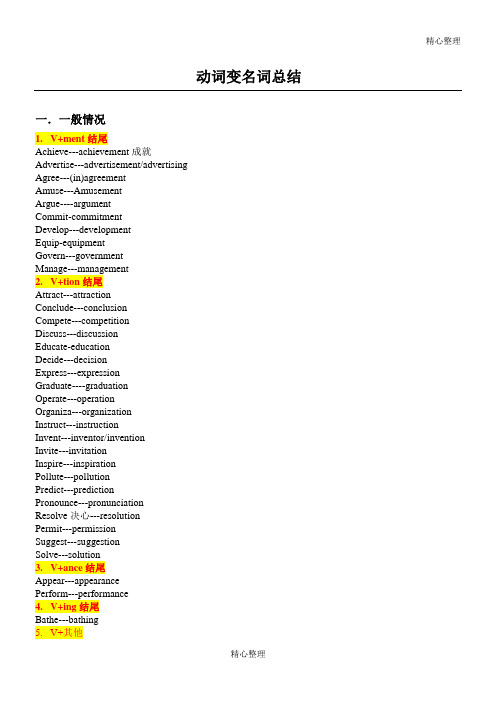
精心整理动词变名词总结一.一般情况1.V+ment结尾Achieve---achievement成就Advertise---advertisement/advertisingAgree---(in)agreementResolve决心---resolutionPermit---permissionSuggest---suggestionSolve---solution3.V+ance结尾Appear---appearancePerform---performance4.V+ing结尾Bathe---bathing5.V+其他Beg---beggarPress---pressureSit---seatFly---flightHeat---heatHit---hitmix---mixture二.具有某种职业或动作的人1.职业和身份1)-an,-ain,表示"……地方的人,精通……的人"American,historian,2)-al,4)-ar,),24)-ist,表示"从事……研究者,信仰……主义者"pianist,communist,dentist,artist,chemist25)-ive,表示"动作者,行为者"native,captive26)-logist,表示"……学家,研究者"biologist,geologist(地质学家)27)-or,表示"……者"author,doctor,operator,28)-ster,表示"做…….事情的人"youngster,gamester(赌徒),songster29)-yer,表示"从事……职业者"lawyer构成,具有抽象名词的含义1)-acy,表示"性质,状态,境遇"accuracy,diplomacy2)-age,表示"状态,行为,身份及其结果,总称"courage,storage,marriage3)-al,a)表示"事物的动作,过程"refusal,arrival,survival,denial,approvalb)表示具体的事物manual,signal,editorial,journal4)-ance,-ence表示"性质,状况,行为,过程,总量,程度"endurance,importance,diligence,difference,obedience5)-ancy,-ency,表示"性质,状态,行为,过程"frequency,urgency,efficiency,6)-bility,表示"动作,性质,状态"possibility,feasibility,7)-craft,表示"工艺,技巧"woodcraft,handicraft,statecraft(治国策)8)-cracy,表示"统治,支配"bureaucracy,democracy9)-cy,表示"性质,状态,职位,级别"bankruptcy(破产),supremacy10)-dom,表示"等级,领域,状态"freedom,kingdom,wisdom11)-ery,-ry,表示"行为,状态,习性"bravery,bribery,rivalry3)-ery,ry,表示"工作场所,饲养所,地点"laundry,nursery,surgery(手术室)4)-ory,表示"工作场所,住处"factory,dormitory,laboratory,observatory带有学术,科技含义1)-grapy,表示"……学,写法"biography,calligraphy,geography2)-ic,ics,表示"……学……法"logic,mechanics,optics,electronics3)-ology,表示"……学……论"biology,zoology,technology(工艺学)4)-nomy,表示"……学……术"astronomy,economy,bionomy(生态学)5)-ery,表示"学科,技术"chemistry,cookery,machinery6)-y,表示"……学,术,法"photography,philosophy3.表示人和事物的总和,集合含义1)-age,baggage,tonnage2)-dom,newspaperdom(新闻界)3)-hood,neighbourhood,womanhood4)-ery,cavalry,ministry(内阁)5)-ure,legislature,judicature4.表示物品和物质名称的含义1)-ant,ent,solvent,constant2)-al,signal,pictorial(画报)3)ar,collar,pillar(石柱)4)-er,boiler,computer,washer,cooker5)ery,drapery(绸缎)6)-ing,clothing,matting,7)-ment,instrument,equipment,attachment 5.表示"细些的含义1)-cle,particle,2)-cule,molecule(分子)3)-el,parcel4)-en,chicken,maiden5)-et,pocket,ticket6)-etta,-ette,etto,cigarette,essayette(短文)7)-kin,napkin8)-ling,duckling,9)-let,booklet10)-y,baby,doggy。
高考常考单词后缀——动词变名词
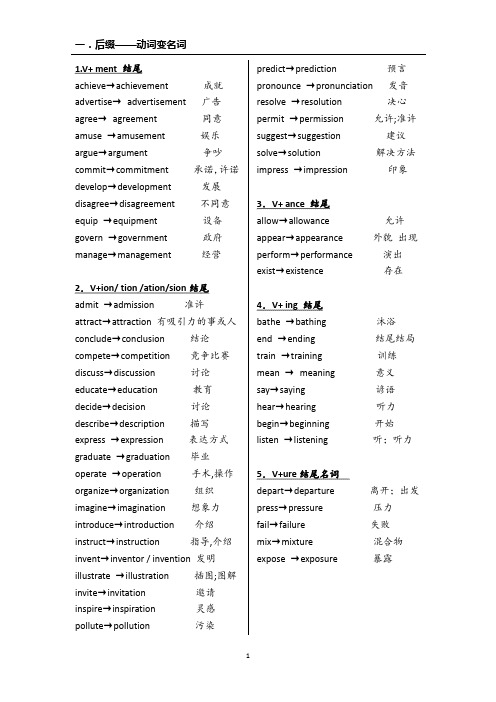
1.V+ ment 结尾achieve→achievement 成就advertise→advertisement 广告agree→agreement 同意amuse →amusement 娱乐argue→argument 争吵commit→commitment 承诺,许诺develop→development 发展disagree→disagreement 不同意equip →equipment 设备govern →government 政府manage→management 经营2.V+ion/ tion /ation/sion结尾admit →admission 准许attract→attraction 有吸引力的事或人conclude→conclusion 结论compete→competition 竞争比赛discuss→discussion 讨论educate→education 教育decide→decision 讨论describe→description 描写express →expression 表达方式graduate →graduation 毕业operate →operation 手术,操作organize→organization 组织imagine→imagination 想象力introduce→introduction 介绍instruct→instruction 指导,介绍invent→inventor / invention 发明illustrate →illustration 插图;图解invite→invitation 邀请inspire→inspiration 灵感pollute→pollution 污染predict→prediction 预言pronounce →pronunciation 发音resolve →resolution 决心permit →permission 允许;准许suggest→suggestion 建议solve→solution 解决方法impress →impression 印象3.V+ ance 结尾allow→allowance 允许appear→appearance 外貌出现perform→performance 演出exist→existence 存在4.V+ ing 结尾bathe →bathing 沐浴end →ending 结尾结局train →training 训练mean →meaning 意义say→saying 谚语hear→hearing 听力begin→beginning 开始listen →listening 听;听力5.V+ure结尾名词depart→departure 离开;出发press→pressure 压力fail→failure 失败mix→mixture 混合物expose →exposure 暴露6.V+y结尾名词recover→recovery 恢复;痊愈discover→discovery 发现7.V+al结尾名词approve →approval 赞成survive →survival 幸存arrive →arrival 到达refuse →refusal 拒绝propose →proposal 提议;建议8.V+y结尾名词recover →recovery 恢复;痊愈discover →discovery 发现9.V+age结尾名词marry →marriage 婚姻carry →carriage 客车厢;运输pack →package 包;盒post →postage 邮资;邮费store →storage 贮存10.V+ 其他beg →beggar 乞丐sit→seat 座位employ→employer 雇主老板→employee 雇员believe→belief 信仰behave→behavior 行为know→knowledge 知识heat→heat 热量hit→hit 轰动一时的人或物碰撞press →pressure 压力receive→receptionist 接待员serve→service 服务succeed→successtour→tourist 游客pursue→pursuit 追求从事withdraw→withdrawal 取钱;撤退analyze→analysis 分析vary →variety 多样化;品种tend →tendency 趋向;趋势grow →growth 生长。
动词变名词的一般规则

动词变名词的一般规则1. 直接加ing:许多动词可以直接在词尾加上-ing形式变成名词。
例如:直接加ing:许多动词可以直接在词尾加上-ing形式变成名词。
例如:- run(跑步) -> running(跑步)- swim(游泳) -> swimming(游泳)2. 去掉e + ing:如果动词以一个辅音字母 + e结尾,可以去掉e,再加上-ing。
例如:去掉e + ing:如果动词以一个辅音字母 + e 结尾,可以去掉e,再加上-ing。
例如:- make(制造) -> making(制造)- bake(烘焙) -> baking(烘焙)3. 双写最后一个辅音字母 + ing:如果动词以一个重读闭音节结尾,并且末尾只有一个辅音字母,需要双写最后一个辅音字母,再加上-ing。
例如:双写最后一个辅音字母 + ing:如果动词以一个重读闭音节结尾,并且末尾只有一个辅音字母,需要双写最后一个辅音字母,再加上-ing。
例如:- swim(游泳) -> swimming(游泳)- sit(坐) -> sitting(坐)4. 变y为i + ing:如果动词以辅音字母 + y结尾,需要将y变为i,再加上-ing。
例如:变y为i + ing:如果动词以辅音字母 + y 结尾,需要将y变为i,再加上-ing。
例如:- study(研究) -> studying(研究)- cry(哭泣) -> crying(哭泣)5. 不规则变化:一些动词的名词形式没有明确的规则,需要记忆。
例如:不规则变化:一些动词的名词形式没有明确的规则,需要记忆。
例如:- go(去) -> going(去)- do(做) -> doing(做)需要注意的是,动词变名词的规则是一般规则,但也有例外情况。
有些动词在变名词时需要进行其他的形态变化。
确保在使用动词变名词时,特别是在写作中,正确使用并了解其中的细微差别。
(完整版)动词变名词
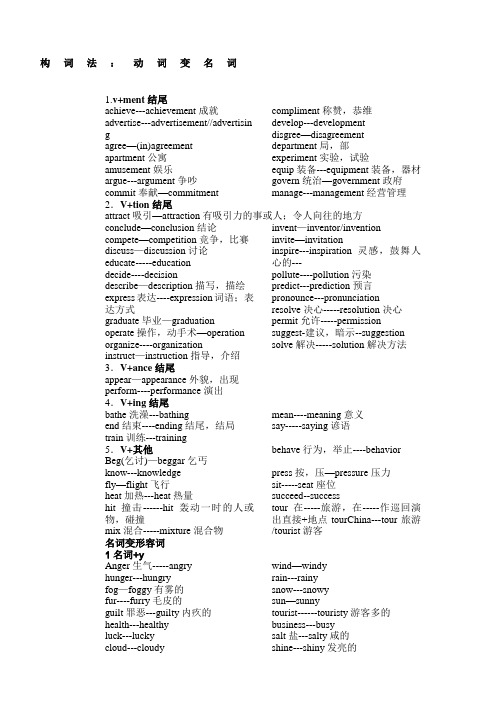
构词法:动词变名词1.v+ment结尾achieve---achievement成就advertise---advertisement//advertisin gagree—(in)agreementapartment公寓amusement娱乐argue---argument争吵commit奉献—commitment compliment称赞,恭维develop---development disgree—disagreement department局,部experiment实验,试验equip装备---equipment装备,器材govern统治—government政府manage---management经营管理2.V+tion结尾attract吸引—attraction有吸引力的事或人;令人向往的地方conclude—conclusion结论compete—competition竞争,比赛discuss—discussion讨论educate-----educationdecide----decision describe—description描写,描绘express表达----expression词语;表达方式graduate毕业—graduation operate操作,动手术—operation organize----organization instruct—instruction指导,介绍invent—inventor/invention invite—invitationinspire---inspiration灵感,鼓舞人心的---pollute----pollution污染predict---prediction预言pronounce---pronunciation resolve决心-----resolution决心permit允许-----permission suggest-建议,暗示--suggestion solve解决-----solution解决方法3.V+ance结尾appear—appearance外貌,出现perform----performance演出4.V+ing结尾bathe洗澡---bathingend结束----ending结尾,结局train训练---training mean----meaning意义say-----saying谚语5.V+其他Beg(乞讨)—beggar乞丐behave行为,举止----behaviorknow---knowledgefly—flight飞行heat加热---heat热量hit撞击------hit轰动一时的人或物,碰撞mix混合-----mixture混合物press按,压—pressure压力sit-----seat座位succeed--successtour在-----旅游,在-----作巡回演出直接+地点tourChina---tour旅游/tourist游客名词变形容词1名词+yAnger生气-----angry hunger---hungry fog—foggy有雾的fur----furry毛皮的guilt罪恶---guilty内疚的health---healthyluck---luckycloud---cloudy wind—windyrain---rainysnow---snowy sun—sunnytourist------touristy游客多的business---busysalt盐---salty咸的shine---shiny发亮的silk丝绸—silky丝绸般的sleep---sleepy昏昏欲睡的taste口味,品味------tasty甜的2.名词+edbalance–balanced平衡的spot斑点,地点----spotted有斑点的talent-----talented有天赋的organized有组织的distusted厌恶的offended生气的crowded拥挤的polluted被污染的pleased高兴的3.名词+ful/lessmeaning—meaningful有意义的care—careful/careless小心的;粗心的help---helpful/helpless home—homeless无家可归的colour---colourful pain疼痛---painful痛苦的use---useless/useful thank—thankful充满感激的peace和平----peaceful平静的,宁静的playful顽皮的,爱玩耍的4.名词+ableadjustable可调整的comfort---comfortable knowledge---knowledgeable suit一套-----suitable合适的5.名词+ousenormous巨大的danger—dangerousmystery神秘-----mysterious神秘的6.ce变tconfidence----confident difference---different7.al结尾medicine药----medical医学的music---musicalnature---natural自然的person---personal(私人的) nation—national国家的education---educational有教育意义的tradition----traditional传统的origin起源---original新颖的;独创的8.名词+lyfriend—friendlylive---lively活跃的,有生气的love—lovely可爱的9.+en结尾wood—wooden木制的wool—woolen羊毛的10.其他energy精力---energeticfool傻子—foolish愚蠢的freedom自由—free空的,免费的height高度—highillness疾病---illlove—loving慈爱的death---deadpleasure---pleasant/pleased popularity流行性—popular pride---proudscientist----scientific科学的方位的词表达名词—形容词East—eastern West—western South—southern North---northern InthewestofChina InthewesternpartofChina四大洲名词-----形容词Asia亚洲–----AsianAfrica非洲-----African Europe欧洲-----European America美洲-----American 形容词变副词1.形容词+lybad—badly bright—brightly明亮地casual—casually随意地clear—clearly清楚地complete—completely完全correct---correctly正确地final--finally fortunate—fortunately幸运地general—generally一般来讲loud—loudlyparticular特殊的,独特的—particularlypolite—politelyproper合适的-,恰当的---properly main------mainly主要地most多数-----mostly多半,大多数normal---normally正常地quick—quicklyquiet—quietly轻轻地,安静地real—reallyrecent最近的----recently最近;近来hard难的;努力地---hardly几乎不late迟的—lately最近;近来sad--sadlyslow---slowly special—specially专门,特殊地specific---specifically特定地,明确地strong—strongly坚决地,强烈地sudden—suddenly突然usual—usually2.以le结尾的去e+ycomfortable---comfortably gentle—gentlypossible---possibly simple----simply仅仅;只;简单地terrible---terribly3.辅音字母+y变ilyeasy—easilyheavy—heavilyhappy--happily4.特殊good—well好地well身体健康的,井true—truly名词---形容词—副词beauty美,美人—beautiful—beautifully care—careful—carefully care—careless—carelessly difference---different---differently happiness—happy—happily hunger—hungry--hungrily health—healthy—healthily luck—lucky—luckily noise—noisy—noisily pride—proud—proudly骄傲地sadness—sad—sadlysafety安全;安全的地方—safe—safelysilence—silent---silently默默地success—successful—successfully truth—true—truly unluck—unlucky—unluckily wonder奇迹—wonderful—wonderfully既是形容词又是副词earlygetupearly;anearlytrain latebelateforclasscomelateforschool deepdivedeepintotheseaaholedeeplarge highjumphigh;ahighmountain hardahardquestion;ahardstoneworkhard/studyhardrainhard longIttakestoolongIttakesalongtime farjumpfar Myhomeisfarfromschool straightastraightline gostraightalonghere。
动词变名词规律总结

动词变名词规律总结 Document number:PBGCG-0857-BTDO-0089-PTT1998动词变名词总结一.一般情况1.V+ment 结尾Achieve---achievement 成就Advertise---advertisement/advertisingAgree---(in)agreementAmuse---AmusementArgue----argumentCommit-commitmentDevelop---developmentEquip-equipmentGovern---governmentManage---management2.V+tion结尾Attract---attractionConclude---conclusionCompete---competitionDiscuss---discussionEducate-educationDecide---decisionExpress---expressionGraduate----graduationOperate---operationOrganiza---organizationInstruct---instructionInvent---inventor/inventionInvite---invitationInspire---inspirationPollute---pollutionPredict---predictionPronounce---pronunciationResolve决心---resolutionPermit---permissionSuggest---suggestionSolve---solution3.V+ance结尾Appear---appearancePerform---performance4.V+ing结尾Bathe---bathing5.V+其他Beg---beggarPress---pressureSit---seatFly---flightHeat---heatHit---hitmix---mixture二.具有某种职业或动作的人1. 职业和身份1) -an, -ain, 表示"……地方的人,精通……的人" American, historian,2) -al, 表示"具有……职务的人" principal,3) -ant,-ent, 表示"……者" merchant, agent, servant, student,4) -ar, 表示"……的人" scholar, liar, peddler5) -ard, -art, 表示"做……的人" coward, laggard, braggart(夸张者)6)-arian, 表示"……派别的人,……主义的人" humanitarian, vegetarian7)-ary, 表示"从事……的人" secretary, missionary8)-ant, 表示"具有……职责的人" candidate, graduate9)-ator, 表示"做……的人" educator, speculator(投机者)10) -crat, 表示"某种政体,主义的支持者" democrat, bureaucrat11) -ee, 表示"动作承受者" employee, examinee12) -eer, 表示"从事于……人" engineer, volunteer13) -er, 表示"从事某种职业的人, 某地区,地方的人" banker, observer, Londoner, villager14) -ese, 表示" ……国人,…..地方的人" Japanese, Cantonese15) -ess, 表示"阴性人称名词, actress, hostess, manageress16) -eur, 表示"……家" amateur, littérateur17) -ian, 表示"……地方人,信仰…….教的人,从事……职业的人" Christian, physician(内科医生), musician18) -ician, 表示"精通者,……家," electrician, magician, technician19) -icist, 表示"……家,…….者, …….能手" physicist, phoneticist, technicist20) -ic, 表示"……者,……师" mechanic, critic21) -ie, 表示"爱,指小" dearie, auntie, lassie(小姑娘)22) -ier, 表示"从事……职业" cavalier, clothier, brazier(黄铜匠)23) -ine, ian, 表示"阴性人称" heroine, ballerina24) -ist, 表示"从事……研究者,信仰……主义者" pianist, communist, dentist, artist, chemist25) -ive, 表示"动作者,行为者" native, captive26) -logist, 表示"……学家,研究者" biologist, geologist(地质学家)27) -or, 表示"……者" author, doctor, operator,28) -ster, 表示"做…….事情的人" youngster, gamester(赌徒),songster29) -yer, 表示" 从事……职业者" lawyer构成,具有抽象名词的含义1)-acy, 表示"性质,状态,境遇" accuracy, diplomacy2) -age, 表示"状态,行为,身份及其结果,总称" courage, storage, marriage3)-al, a) 表示"事物的动作,过程" refusal, arrival, survival, denial, approvalb) 表示具体的事物 manual, signal, editorial, journal4)-ance, -ence表示"性质,状况,行为,过程,总量,程度" endurance, importance, diligence, difference, obedience5)-ancy, -ency, 表示"性质,状态,行为,过程" frequency, urgency, efficiency,6)-bility, 表示"动作,性质,状态" possibility, feasibility,7) -craft, 表示"工艺,技巧" woodcraft, handicraft, statecraft(治国策)8)-cracy, 表示"统治,支配" bureaucracy, democracy9)-cy, 表示"性质,状态,职位,级别" bankruptcy(破产),supremacy10) -dom, 表示"等级,领域,状态" freedom, kingdom, wisdom11) -ery, -ry, 表示"行为,状态,习性" bravery, bribery, rivalry12) -ety, 表示"性质,状态" variety, dubiety(怀疑)13) -faction, -facture, 表示"作成,……化,作用" satisfaction, manufacture14) -hood, 表示"资格,身份, 年纪,状态" childhood, manhood, falsehood15) -ice, 表示"行为,性质,状态" notice, justice, service16) -ine, 表示"带有抽象概念" medicine, discipline, famine17) -ing, 表示"动作的过程,结果" building, writing, learning18) -ion, -sion, -tion, -ation, -ition, 表示"行为的过程,结果,状况" action, solution, conclusion, destruction, expression, correction19) -ise, 表示"性质,状态" exercise, merchandise(商业)20) -ism, 表示"制度,主义,学说,信仰,行为" socialism, criticism, colloquialism, heroism21) -ity, 表示"性质,状态,程度" purity, reality, ability, calamity22) -ment, 表示"行为,状态,过程,手段及其结果 treatment, movement, judgment, punishment, argument23) -mony, 表示"动作的结果,状态" ceremony, testimony24) -ness, 表示"性质,状态,程度" goodness, kindness, tiredness, friendliness25) -or, -our, 表示"动作,性质,状态" favor, error,26) -osity, 表示"动作,状态" curiosity27) -ship, 表示"情况,性质,技巧,技能及身份,职业" hardship, membership, friendship28) -th, 表示"动作,性质,过程,状态" depth, wealth, truth, length, growth29) -tude, 表示"性质,状态,程度" latitude, altitude(海拔)30) -ure, 表示"行为,结果" exposure, pressure, failure, procedure(手续),31) -y, 表示"行为的结果,状态,性质" glory, history, victory, inquiry2. 带有场所,地方的含义1)-age, 表示"住所,地点" village, cottage2) -ary, 表示"住所,场地" library, granary (谷仓)3) -ery, ry, 表示"工作场所,饲养所,地点" laundry, nursery, surgery(手术室)4) -ory, 表示"工作场所,住处" factory, dormitory, laboratory, observatory带有学术,科技含义1) -grapy, 表示"……学,写法" biography, calligraphy, geography2) -ic, ics, 表示"……学……法" logic, mechanics, optics, electronics3) -ology, 表示"……学……论" biology, zoology, technology(工艺学)4) -nomy, 表示"……学……术" astronomy, economy, bionomy(生态学)5)-ery, 表示"学科,技术" chemistry, cookery, machinery6)-y, 表示"……学,术,法" photography, philosophy3. 表示人和事物的总和,集合含义1) -age, baggage, tonnage2)-dom, newspaperdom(新闻界)3) -hood, neighbourhood, womanhood4)-ery, cavalry, ministry(内阁)5) -ure, legislature, judicature4. 表示物品和物质名称的含义1)-ant, ent, solvent, constant2)-al, signal, pictorial(画报)3)ar, collar, pillar(石柱)4)- er, boiler, computer, washer, cooker5)ery, drapery(绸缎)6) -ing, clothing, matting,7) -ment, instrument, equipment, attachment5. 表示"细些的含义1) -cle, particle,2) -cule, molecule(分子)3) -el, parcel4) -en, chicken, maiden5) -et, pocket, ticket6) -etta, -ette, etto, cigarette, essayette(短文)7) -kin, napkin8)-ling, duckling,9) -let, booklet10) -y, baby, doggy。
re结尾动词变名词 规律
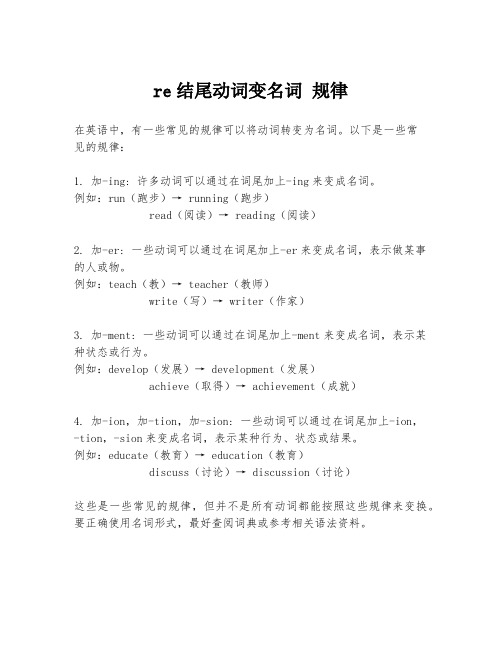
re结尾动词变名词规律
在英语中,有一些常见的规律可以将动词转变为名词。
以下是一些常
见的规律:
1. 加-ing: 许多动词可以通过在词尾加上-ing来变成名词。
例如:run(跑步)→ running(跑步)
read(阅读)→ reading(阅读)
2. 加-er: 一些动词可以通过在词尾加上-er来变成名词,表示做某事的人或物。
例如:teach(教)→ teacher(教师)
write(写)→ writer(作家)
3. 加-ment: 一些动词可以通过在词尾加上-ment来变成名词,表示某种状态或行为。
例如:develop(发展)→ development(发展)
achieve(取得)→ achievement(成就)
4. 加-ion,加-tion,加-sion: 一些动词可以通过在词尾加上-ion,
-tion,-sion来变成名词,表示某种行为、状态或结果。
例如:educate(教育)→ education(教育)
discuss(讨论)→ discussion(讨论)
这些是一些常见的规律,但并不是所有动词都能按照这些规律来变换。
要正确使用名词形式,最好查阅词典或参考相关语法资料。
动词变名词的后缀规律
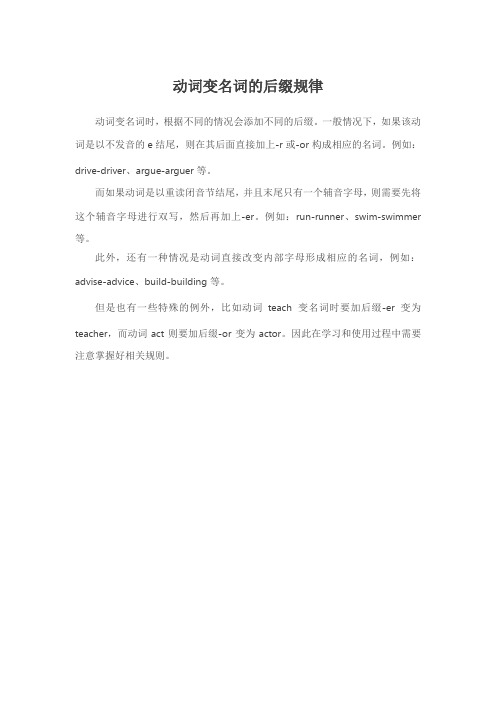
动词变名词的后缀规律
动词变名词时,根据不同的情况会添加不同的后缀。
一般情况下,如果该动词是以不发音的e结尾,则在其后面直接加上-r或-or构成相应的名词。
例如:drive-driver、argue-arguer等。
而如果动词是以重读闭音节结尾,并且末尾只有一个辅音字母,则需要先将这个辅音字母进行双写,然后再加上-er。
例如:run-runner、swim-swimmer 等。
此外,还有一种情况是动词直接改变内部字母形成相应的名词,例如:advise-advice、build-building等。
但是也有一些特殊的例外,比如动词teach变名词时要加后缀-er变为teacher,而动词act则要加后缀-or变为actor。
因此在学习和使用过程中需要注意掌握好相关规则。
动词变名词的规律
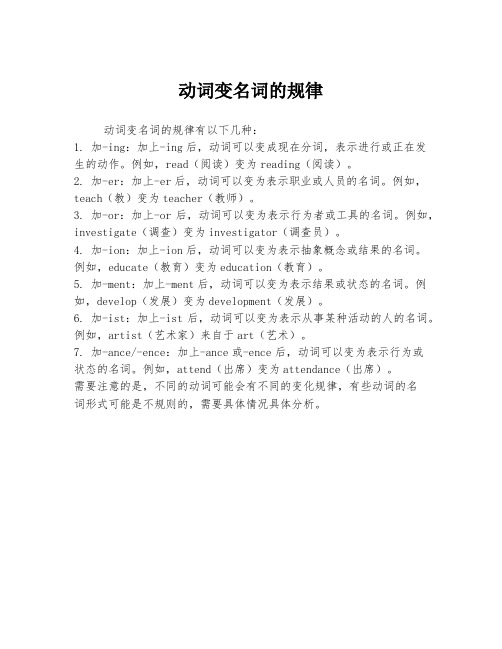
动词变名词的规律
动词变名词的规律有以下几种:
1. 加-ing:加上-ing后,动词可以变成现在分词,表示进行或正在发生的动作。
例如,read(阅读)变为reading(阅读)。
2. 加-er:加上-er后,动词可以变为表示职业或人员的名词。
例如,teach(教)变为teacher(教师)。
3. 加-or:加上-or后,动词可以变为表示行为者或工具的名词。
例如,investigate(调查)变为investigator(调查员)。
4. 加-ion:加上-ion后,动词可以变为表示抽象概念或结果的名词。
例如,educate(教育)变为education(教育)。
5. 加-ment:加上-ment后,动词可以变为表示结果或状态的名词。
例如,develop(发展)变为development(发展)。
6. 加-ist:加上-ist后,动词可以变为表示从事某种活动的人的名词。
例如,artist(艺术家)来自于art(艺术)。
7. 加-ance/-ence:加上-ance或-ence后,动词可以变为表示行为或
状态的名词。
例如,attend(出席)变为attendance(出席)。
需要注意的是,不同的动词可能会有不同的变化规律,有些动词的名
词形式可能是不规则的,需要具体情况具体分析。
动词转化为名词 规则
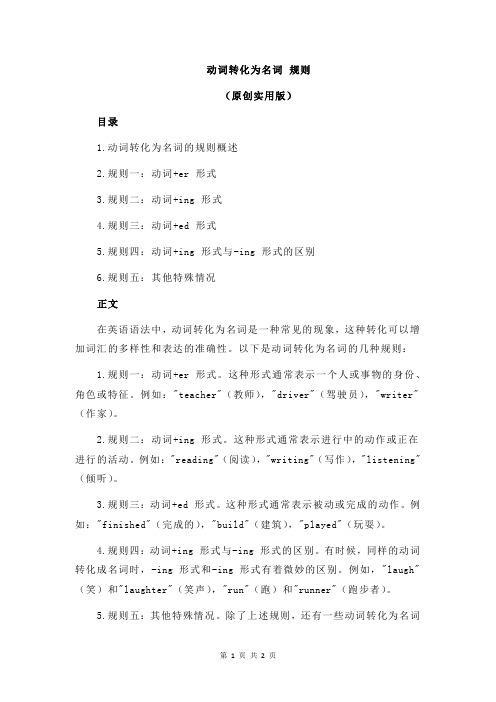
动词转化为名词规则(原创实用版)目录1.动词转化为名词的规则概述2.规则一:动词+er 形式3.规则二:动词+ing 形式4.规则三:动词+ed 形式5.规则四:动词+ing 形式与-ing 形式的区别6.规则五:其他特殊情况正文在英语语法中,动词转化为名词是一种常见的现象,这种转化可以增加词汇的多样性和表达的准确性。
以下是动词转化为名词的几种规则:1.规则一:动词+er 形式。
这种形式通常表示一个人或事物的身份、角色或特征。
例如:"teacher"(教师),"driver"(驾驶员),"writer"(作家)。
2.规则二:动词+ing 形式。
这种形式通常表示进行中的动作或正在进行的活动。
例如:"reading"(阅读),"writing"(写作),"listening"(倾听)。
3.规则三:动词+ed 形式。
这种形式通常表示被动或完成的动作。
例如:"finished"(完成的),"build"(建筑),"played"(玩耍)。
4.规则四:动词+ing 形式与-ing 形式的区别。
有时候,同样的动词转化成名词时,-ing 形式和-ing 形式有着微妙的区别。
例如,"laugh"(笑)和"laughter"(笑声),"run"(跑)和"runner"(跑步者)。
5.规则五:其他特殊情况。
除了上述规则,还有一些动词转化为名词的特殊情况。
例如,"dead"(死亡)是由"die"(死)转化而来,"talk"(谈话)是由"speak"(说话)转化而来。
高考备考词汇复习词性转换之动词变名词常见规律及高频考词
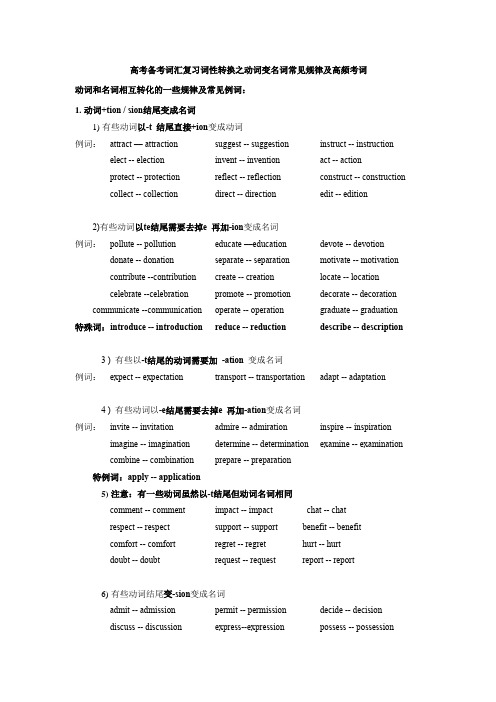
高考备考词汇复习词性转换之动词变名词常见规律及高频考词动词和名词相互转化的一些规律及常见例词:1.动词+tion / sion结尾变成名词1)有些动词以-t 结尾直接+ion变成动词例词:attract –– attraction suggest -- suggestion instruct -- instruction elect -- election invent -- invention act -- actionprotect -- protection reflect -- reflection construct -- constructioncollect -- collection direct -- direction edit -- edition2)有些动词以te结尾需要去掉e 再加-ion变成名词例词:pollute -- pollution educate ––education devote -- devotion donate -- donation separate -- separation motivate -- motivationcontribute --contribution create -- creation locate -- locationcelebrate --celebration promote -- promotion decorate -- decoration communicate --communication operate -- operation graduate -- graduation 特殊词:introduce -- introduction reduce -- reduction describe -- description3 ) 有些以-t结尾的动词需要加-ation 变成名词例词:expect -- expectation transport -- transportation adapt -- adaptation4 ) 有些动词以-e结尾需要去掉e 再加-ation变成名词例词:invite -- invitation admire -- admiration inspire -- inspiration imagine -- imagination determine -- determination examine -- examinationcombine -- combination prepare -- preparation特例词:apply -- application5)注意:有一些动词虽然以-t结尾但动词名词相同comment -- comment impact -- impact chat -- chatrespect -- respect support -- support benefit -- benefitcomfort -- comfort regret -- regret hurt -- hurtdoubt -- doubt request -- request report -- report6)有些动词结尾变-sion变成名词admit -- admission permit -- permission decide -- decisiondiscuss -- discussion express--expression possess -- possessionimpress-- impression conclude -conclusion2.动词+ ment 变成名词例词:achieve –– achievement develop –– development agree -- agreement advertise -- advertisement govern -- government amuse -- amusementmanage -- management excite -- excitement disappoint -- disappointmentappoint -- appointment treat -- treatment adjust -- adjustmentarrange -- arrangement invest -- investment argue -- argument3.动词+ance变成名词例词:allow -- allowance appear -- appearance disappear -- disappearance perform -- performance guide -- guidance rely -- reliance 特例词:exist -- existence refer – reference prefer – preference4.动词+ing变成名词例词:end -- ending train -- training mean -- meaningsay -- saying understand -- understanding greet -- greeting5.其他一些变化及不规则变化常见词appro ve -- appro val survive -- survival arrive -- arrivalbelie ve -- belie f relieve -- relief behave--behaviorserve -- service solve -- solution apologize -- apologycomplain -- complaint compete -- competition respond -- responseaffect -- effect fail -- failure succeed-- successmix -- mixture analyze -- analysis press -- pressuregrow -- growth discover -- discovery choose -- choice。
英语单词词性转换的基本规律
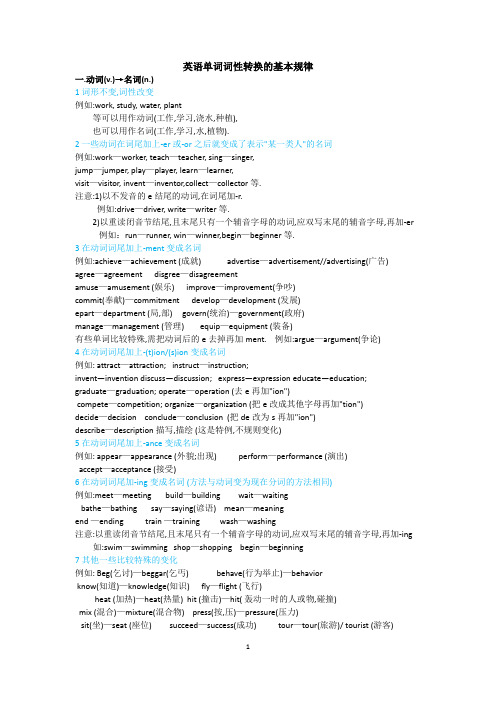
英语单词词性转换的基本规律一.动词(v.)→名词(n.)1词形不变,词性改变例如:work, study, water, plant等可以用作动词(工作,学习,浇水,种植),也可以用作名词(工作,学习,水,植物).2一些动词在词尾加上-er或-or之后就变成了表示"某一类人"的名词例如:work—worker, teach—teacher, sing—singer,jump—jumper, play—player, learn—learner,visit—visitor, invent—inventor,collect—collector等.注意:1)以不发音的e结尾的动词,在词尾加-r.例如:drive—driver, write—writer等.2)以重读闭音节结尾,且末尾只有一个辅音字母的动词,应双写末尾的辅音字母,再加-er例如:run—runner, win—winner,begin—beginner等.3在动词词尾加上-ment 变成名词例如:achieve—achievement (成就) advertise—advertisement//advertising(广告) agree—agreement disgree—disagreementamuse—amusement (娱乐) improve—improvement(争吵)commit(奉献)—commitment develop—development (发展)epart—department (局,部) govern(统治)—government(政府) manage—management (管理) equip—equipment (装备)有些单词比较特殊,需把动词后的e去掉再加ment. 例如:argue—argument(争论)4在动词词尾加上-(t)ion/(s)ion变成名词例如: attract—attraction; instruct—instruction;invent—invention discuss—discussion; express—expression educate—education; graduate—graduation; operate—operation (去e再加"ion")compete—competition; organize—organization (把e改成其他字母再加"tion") decide—decision conclude—conclusion (把de改为s再加"ion") describe—description描写,描绘 (这是特例,不规则变化)5在动词词尾加上-ance变成名词例如: appear—appearance (外貌;出现) perform—performance (演出)accept—acceptance (接受)6在动词词尾加-ing变成名词 (方法与动词变为现在分词的方法相同)例如:meet—meeting build—building wait—waitingbathe—bathing say—saying(谚语) mean—meaningend —ending train —training wash—washing注意:以重读闭音节结尾,且末尾只有一个辅音字母的动词,应双写末尾的辅音字母,再加-ing 如:swim—swimming shop—shopping begin—beginning7其他一些比较特殊的变化例如: Beg(乞讨)—beggar(乞丐) behave(行为举止)—behaviorknow(知道)—knowledge(知识) fly—flight (飞行)heat (加热)—heat(热量) hit (撞击)—hit( 轰动一时的人或物,碰撞)mix (混合)—mixture(混合物) press(按,压)—pressure(压力)sit(坐)—seat (座位) succeed—success(成功) tour—tour(旅游)/ tourist (游客)1动词后面加able,以e结尾的动词则去e加able,表示具有此性质,特点或属性.例如: afford-affordable;love-lovable2动词后面加ed,以e结尾的动词则直接加d,表示被动性的属性或特点.例如: scatter-scattered use-used2不规则的动词则必须记忆,记住其过去分词形式.规律不大,意义同(b).三.名词(n.)→形容词(adj.)1在名词后面加-y可以变成形容词(尤其是一些与天气有关的名词)例如: rain—rainy, cloud—cloudy, wind—windy, snow—snowy,health—healthy, luck—lucky,anger—angry guilt—guilty(内疚的)tourist—touristy(游客多的) , salt (盐)—salty (咸的)silk(丝绸)—silky(丝绸般的), sleep—sleepy (昏昏欲睡的)注意:1)如果以重读闭音节结尾,且词尾只有一个辅音字母,这时应双写辅音字母再加"-y".如: sun—sunny, fun—funny, fog—foggy(有雾的), fur—furry(毛皮的)2)少数以不发音的e结尾的名词变为形容词时,应去掉e再加"-y".如: noise—noisy, ice—icy, shine—shiny(发亮的), taste(口味)—tasty(甜的)2名词后面加-ed,以e结尾的直接加d.例如: spot(斑点)—spotted(有斑点的); talent—talented (有天赋的)organize—organized 有组织的; balance—balanced(平衡的)3一些抽象名词在词尾加-ful可以变为形容词例如:care—careful, thank1—thankful, help—helpful, use—useful, meaning—meaningful 4在名词后加-less构成含有否定意义的形容词例如:care—careless(粗心的), use—useless(无用的)hope—hopeless(没希望的),home—homeless(无家可归的)5一些以-ce结尾的名词,把-ce改为-t变成形容词例如: difference—different, silence—silent, confidence—confident6.在名词后加-ly变为形容词例如: friend—friendly, love—lovely, live---lively7.在名词后加-ous变为形容词例如: danger—dangerous8名词后面加-al变为形容词例如: music—musical; medicine—medical (这个比较特殊)9名词后面加-able变为形容词,如果以e结尾就去e再加"-able".例如: adjust—adjustable 可调整的 value—valuable有价值的10名词后面加-en变成形容词例如: wood—wooden 木制的 wool—woolen 羊毛的11一些表示国家的名词可以在词尾加-ese, -ish或-n构成表示国籍,语言的形容词例如:China—Chinese, Japan—Japanese, England—English,America—American, India—Indian, Australia —Australian(注意Canada—Canadian)▲一般在形容词的词尾加-ly可以变成副词例如: quick—quickly, slow—slowly, loud—loudly, sudden—suddenly 等但是,以下几点值得注意:1一些以"辅音字母+y"结尾的形容词,要把y改为i再加-ly例如: happy—happily, angry—angrily, lucky—luckily, heavy—heavily, noisy—noisily有些以-ble或-le结尾的形容词,去掉e加-y例如:possible—possibly, terrible—terribly3少数以e结尾的形容词,要去掉e再加-ly例如: true—truly但绝大多数以e结尾的形容词仍然直接加-ly例如: polite—politely, wide—widely4以-l结尾的形容词变为副词时要在词尾加-ly,以-ll结尾的才在词尾只加-y.例如: usual—usually, careful—carefully, useful—usefullyfull—fully (以-ll结尾的才只加y)PS:有些同学可能对元音辅音以及重读闭音节不是很了解,那我在这里再做下补充说明. 1.英语26个字母中,a e i o u是元音字母, y是半元音字母, 其余都是辅音字母.★所谓半元音就是有时候做元音,有时候做辅音.半元音字母y做元音有: shy,sky 做辅音比如最简单的:yes2.开音节和闭音节开音节分两种:绝对开音节和相对开音节绝对开音节指的是"元音字母结尾"的音节 (例如 we, hi等)相对开音节是指"辅音字母-元音字母-辅音字母-不发音的e"的音节,(r除外). ( 例如,take,make 等)比如:take (在这个单词中,t是辅音,a是元音,k是辅音,e是不发音的元音)◆在开音节中, 元音字母发他们在字母表中的音闭音节, 则是指"辅音字母-元音字母-辅音字母"的音节 ( -al等除外) (例如:leg,cross等)◆在闭音节中,元音字母发不同的音 a e i o u例 sat let sit not nut (试着读下这些单词,这些单词中,元音发的音都不是它们在字母表中发的音)2.英语重读闭音节就是以辅音因素结尾的,而且是重读音节的音节.比如apple 划音节就因该是ap/ple 前面那个ap是一个音节,这个音节以辅音因素p结尾,所以就是闭音节.(仅仅能看出是闭音节,是不是重读闭音节还要看这个音节是不是重读的) 重读闭音节三要素:1. 必须是重读音节;2. 最后只有一个辅音字母;3.元音字母发短元音 ( 说通俗点,打个比方, /u/是短元音,/u:/是长元音)重读闭音节即两个辅音中间夹一个元音.如:sit---sitting begin---beginning(重读在gin这个音节上)●像travel这个单词,"vel"也是"辅音+元音+辅音"的结构,但是重音不在vel这个音节上,所以不用双写"l",可以为travelled,也可以是traveled,更常用的是后者.。
英语单词词性转换的基本规律

英语单词词性转换的基本规律一词性变换的一般的规律1.动词(v.)→名词(n.)(a)词形不变,词性改变work, study, water, plant等可以用作动词(工作,学习,浇水,种植),也可以用作名词(工作,学习,水,植物).(b)一些动词在词尾加上-er或-or之后就变成了表示"某一类人"的名词例如:work—worker, teach—teacher, sing—singer, jump—jumper, play—player, learn—learner, visit—visitor, invent—inventor,collect—collector等.注意:1)以不发音的e结尾的动词,在词尾加-r.例如:drive—driver, write—writer等.2)以重读闭音节结尾,且末尾只有一个辅音字母的动词,应双写末尾的辅音字母,再加-er例如:run—runner, win—winner,begin—beginner等.(c)在动词词尾加上-ment 变成名词例如:achieve—achievement (成就) advertise—advertisement(广告) agree—agreement disagree—disagreementamuse—amusement (娱乐) improve—improvement(争吵)commit(奉献)—commitment develop—development (发展)depart—department (局,部) govern(统治)—government(政府)manage—management (管理) equip—equipment (装备)有些单词比较特殊,需把动词后的e去掉再加ment.例如:argue—argument(争论)(d)在动词词尾加上-(t)ion/(s)ion变成名词例如: attract—attraction; instruct—instruction;invent—invention discuss—discussion;express—expression educate—education;graduate—graduation; operate—operation (去e再加"ion")compete—competition; organize—organization (把e改成其他字母再加"tion") decide—decision conclude—conclusion (把de改为s再加"ion")describe—description描写,描绘(这是特例,不规则变化)(e)在动词词尾加上-ance变成名词例如: appear—appearance (外貌;出现) perform—performance (演出)accept—acceptance (接受)(f)在动词词尾加-ing变成名词(方法与动词变为现在分词的方法相同)例如: meet—meeting build—building wait—waitingbathe—bathing say—saying(谚语) mean—meaningend —ending train —training wash—washing注意:以重读闭音节结尾,且末尾只有一个辅音字母的动词,应双写末尾的辅音字母,再加-ing如:swim—swimming shop—shopping begin—beginning(g)其他一些比较特殊的变化例如: Beg(乞讨)—beggar(乞丐) behave(行为举止)—behaviorknow(知道)—knowledge(知识) fly—flight (飞行)heat (加热)—heat(热量) hit (撞击)—hit( 轰动一时的人或物,碰撞)mix (混合)—mixture(混合物) press(按,压)—pressure(压力)sit(坐)—seat (座位) succeed—success(成功)tour—tour(旅游)/ tourist (游客)2.动词(v.)→形容词(adj.)(a)动词后面加able,以e结尾的动词则去e加able,表示具有此性质,特点或属性.例如: afford-affordable;love-lovable(b)动词后面加ed,以e结尾的动词则直接加d,表示被动性的属性或特点.例如: scatter-scattered use-used(c)不规则的动词则必须记忆,记住其过去分词形式.规律不大,意义同(b).3.名词(n.)→形容词(adj.)(a)在名词后面加-y可以变成形容词(尤其是一些与天气有关的名词)例如: rain—rainy, cloud—cloudy, wind—windy, snow—snowy,health—healthy, luck—lucky,anger—angry guilt—guilty(内疚的)tourist—touristy(游客多的) , salt (盐)—salty (咸的)silk(丝绸)—silky(丝绸般的), sleep—sleepy (昏昏欲睡的)注意:1)如果以重读闭音节结尾,且词尾只有一个辅音字母,这时应双写辅音字母再加"-y". 如: sun —sunny, fun—funny, fog—foggy(有雾的), fur—furry(毛皮的)2)少数以不发音的e结尾的名词变为形容词时,应去掉e再加"-y".如: noise—noisy, ice—icy, shine—shiny(发亮的), taste(口味)—tasty(甜的)(b)名词后面加-ed,以e结尾的直接加 d.例如: spot(斑点)—spotted(有斑点的); talent—talented (有天赋的)organize—organized 有组织的; balance—balanced(平衡的)(c)一些抽象名词在词尾加-ful可以变为形容词例如:care—careful, thank—thankful, help—helpful,use—useful, meaning—meaningful(d)在名词后加-less构成含有否定意义的形容词例如:care—careless(粗心的), use—useless(无用的)hope—hopeless(没希望的),home—homeless(无家可归的)(e)一些以-ce结尾的名词,把-ce改为-t变成形容词例如: difference—different, silence—silent, confidence—confident(f).在名词后加-ly变为形容词例如: friend—friendly, love—lovely, live---lively(g).在名词后加-ous变为形容词例如: danger—dangerous(h)名词后面加-al变为形容词例如: music—musical; medicine—medical (这个比较特殊)(i)名词后面加-able变为形容词,如果以e结尾就去e再加"-able".例如: adjust—adjustable 可调整的value—valuable有价值的(j)名词后面加-en变成形容词例如: wood—wooden 木制的wool—woolen 羊毛的(k)一些表示国家的名词可以在词尾加-ese, -ish或-n构成表示国籍,语言的形容词例如:China—Chinese, Japan—Japanese, England—English,America—American, India—Indian, Australia —Australian (注意Canada—Canadian)4.形容词(adj.)→副词(adv.)▲一般在形容词的词尾加-ly可以变成副词例如: quick—quickly, slow—slowly, loud—loudly, sudden—suddenly 等但是,以下几点值得注意:(a) 一些以"辅音字母+y"结尾的形容词,要把y改为i再加-ly例如: happy—happily, angry—angrily, lucky—luckily, heavy—heavily, noisy—noisily(b) 有些以-ble或-le结尾的形容词,去掉e加-y例如:possible—possibly, terrible—terribly(c)少数以e结尾的形容词,要去掉e再加-ly例如: true—truly但绝大多数以e结尾的形容词仍然直接加-ly 例如: polite—politely, wide—widely(d)以-l结尾的形容词变为副词时要在词尾加-ly,以-ll结尾的才在词尾只加-y.例如: usual—usually, careful—carefully, useful—usefullyfull—fully (以-ll结尾的才只加y)二. 派生:指由一个词根加上前缀和(或)后缀构成另一个词的构词形式。
- 1、下载文档前请自行甄别文档内容的完整性,平台不提供额外的编辑、内容补充、找答案等附加服务。
- 2、"仅部分预览"的文档,不可在线预览部分如存在完整性等问题,可反馈申请退款(可完整预览的文档不适用该条件!)。
- 3、如文档侵犯您的权益,请联系客服反馈,我们会尽快为您处理(人工客服工作时间:9:00-18:30)。
动词变名词总结一.一般情况1.V+ment 结尾Achieve---achievement 成就Advertise---advertisement/advertisingAgree---(in)agreementAmuse---AmusementArgue----argumentCommit-commitmentDevelop---developmentEquip-equipmentGovern---governmentManage---management2.V+tion结尾Attract---attractionConclude---conclusionCompete---competitionDiscuss---discussionEducate-educationDecide---decisionExpress---expressionGraduate----graduationOperate---operationOrganiza---organizationInstruct---instructionInvent---inventor/inventionInvite---invitationInspire---inspirationPollute---pollutionPredict---predictionPronounce---pronunciationResolve决心---resolutionPermit---permissionSuggest---suggestionSolve---solution3.V+ance结尾Appear---appearancePerform---performance4.V+ing结尾Bathe---bathing5.V+其他Beg---beggarPress---pressureSit---seatFly---flightHeat---heatHit---hitmix---mixture二.具有某种职业或动作的人1. 职业和身份1) -an, -ain, 表示"……地方的人,精通……的人" American, historian,2) -al, 表示"具有……职务的人" principal,3) -ant,-ent, 表示"……者" merchant, agent, servant, student,4) -ar, 表示"……的人" scholar, liar, peddler5) -ard, -art, 表示"做……的人" coward, laggard, braggart(夸张者)6)-arian, 表示"……派别的人,……主义的人" humanitarian, vegetarian7)-ary, 表示"从事……的人" secretary, missionary8)-ant, 表示"具有……职责的人" candidate, graduate9)-ator, 表示"做……的人" educator, speculator(投机者)10) -crat, 表示"某种政体,主义的支持者" democrat, bureaucrat11) -ee, 表示"动作承受者" employee, examinee12) -eer, 表示"从事于……人" engineer, volunteer13) -er, 表示"从事某种职业的人, 某地区,地方的人" banker, observer, Londoner, villager14) -ese, 表示" ……国人,…..地方的人" Japanese, Cantonese15) -ess, 表示"阴性人称名词,actress, hostess, manageress16) -eur, 表示"……家" amateur, littérateur17) -ian, 表示"……地方人,信仰…….教的人,从事……职业的人" Christian, physician(内科医生),musician18) -ician, 表示"精通者,……家," electrician, magician, technician19) -icist, 表示"……家,…….者, …….能手" physicist, phoneticist, technicist20) -ic, 表示"……者,……师" mechanic, critic21) -ie, 表示"爱,指小" dearie, auntie, lassie(小姑娘)22) -ier, 表示"从事……职业" cavalier, clothier, brazier(黄铜匠)23) -ine, ian, 表示"阴性人称" heroine, ballerina24) -ist, 表示"从事……研究者,信仰……主义者" pianist, communist, dentist, artist, chemist25) -ive, 表示"动作者,行为者" native, captive26) -logist, 表示"……学家,研究者" biologist, geologist(地质学家)27) -or, 表示"……者" author, doctor, operator,28) -ster, 表示"做…….事情的人" youngster, gamester(赌徒),songster29) -yer, 表示" 从事……职业者" lawyer构成,具有抽象名词的含义1)-acy, 表示"性质,状态,境遇" accuracy, diplomacy2) -age, 表示"状态,行为,身份及其结果,总称" courage, storage, marriage3)-al, a) 表示"事物的动作,过程" refusal, arrival, survival, denial, approvalb) 表示具体的事物manual, signal, editorial, journal4)-ance, -ence表示"性质,状况,行为,过程,总量,程度" endurance, importance, diligence, difference, obedience5)-ancy, -ency, 表示"性质,状态,行为,过程" frequency, urgency, efficiency,6)-bility, 表示"动作,性质,状态" possibility, feasibility,7) -craft, 表示"工艺,技巧" woodcraft, handicraft, statecraft(治国策)8)-cracy, 表示"统治,支配" bureaucracy, democracy9)-cy, 表示"性质,状态,职位,级别" bankruptcy(破产),supremacy10) -dom, 表示"等级,领域,状态" freedom, kingdom, wisdom11) -ery, -ry, 表示"行为,状态,习性" bravery, bribery, rivalry12) -ety, 表示"性质,状态" variety, dubiety(怀疑)13) -faction, -facture, 表示"作成,……化,作用" satisfaction, manufacture14) -hood, 表示"资格,身份, 年纪,状态" childhood, manhood, falsehood15) -ice, 表示"行为,性质,状态" notice, justice, service16) -ine, 表示"带有抽象概念" medicine, discipline, famine17) -ing, 表示"动作的过程,结果" building, writing, learning18) -ion, -sion, -tion, -ation, -ition, 表示"行为的过程,结果,状况" action, solution, conclusion, destruction, expression, correction19) -ise, 表示"性质,状态" exercise, merchandise(商业)20) -ism, 表示"制度,主义,学说,信仰,行为" socialism, criticism, colloquialism, heroism21) -ity, 表示"性质,状态,程度" purity, reality, ability, calamity22) -ment, 表示"行为,状态,过程,手段及其结果treatment, movement, judgment, punishment, argument23) -mony, 表示"动作的结果,状态" ceremony, testimony24) -ness, 表示"性质,状态,程度" goodness, kindness, tiredness, friendliness25) -or, -our, 表示"动作,性质,状态" favor, error,26) -osity, 表示"动作,状态" curiosity27) -ship, 表示"情况,性质,技巧,技能及身份,职业" hardship, membership, friendship28) -th, 表示"动作,性质,过程,状态" depth, wealth, truth, length, growth29) -tude, 表示"性质,状态,程度" latitude, altitude(海拔)30) -ure, 表示"行为,结果" exposure, pressure, failure, procedure(手续),31) -y, 表示"行为的结果,状态,性质" glory, history, victory, inquiry2. 带有场所,地方的含义1)-age, 表示"住所,地点" village, cottage2) -ary, 表示"住所,场地" library, granary (谷仓)3) -ery, ry, 表示"工作场所,饲养所,地点" laundry, nursery, surgery(手术室)4) -ory, 表示"工作场所,住处" factory, dormitory, laboratory, observatory 带有学术,科技含义1) -grapy, 表示"……学,写法" biography, calligraphy, geography2) -ic, ics, 表示"……学……法" logic, mechanics, optics, electronics3) -ology, 表示"……学……论" biology, zoology, technology(工艺学)4) -nomy, 表示"……学……术" astronomy, economy, bionomy(生态学)5)-ery, 表示"学科,技术" chemistry, cookery, machinery6)-y, 表示"……学,术,法" photography, philosophy3. 表示人和事物的总和,集合含义1) -age, baggage, tonnage2)-dom, newspaperdom(新闻界)3) -hood, neighbourhood, womanhood4)-ery, cavalry, ministry(内阁)5) -ure, legislature, judicature4. 表示物品和物质名称的含义1)-ant, ent, solvent, constant2)-al, signal, pictorial(画报)3)ar, collar, pillar(石柱)4)- er, boiler, computer, washer, cooker5)ery, drapery(绸缎)6) -ing, clothing, matting,7) -ment, instrument, equipment, attachment5. 表示"细些的含义1) -cle, particle,2) -cule, molecule(分子)3) -el, parcel4) -en, chicken, maiden5) -et, pocket, ticket6) -etta, -ette, etto, cigarette, essayette(短文)7) -kin, napkin8)-ling, duckling,9) -let, booklet10) -y, baby, doggy。
